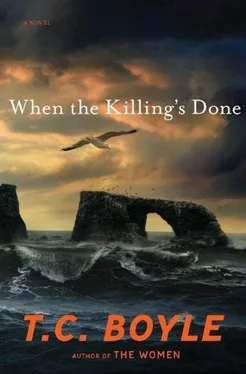The boat had begun to roll a bit, nothing serious, nothing out of the ordinary, the weather out here as changeable as can be, and with the sweatshirt on and sitting in the sun she was comfortable and the sandwich was good and the coffee still hot. At thirty minutes, neither Greg nor Mickey had surfaced, meaning the pickings were a little slimmer than they’d thought or that the currents down below were banging them around a bit so the going was slower than usual. She chewed her way around the sandwich, keeping the center for last, then licked the grease from her fingers, wishing she’d thought to tear off a paper towel for a napkin and then finally just wiping her hands on her shorts, which needed washing in any case. When they’d been down thirty-five minutes she got up to look for their bubbles, tracing the lines of the hoses out twenty feet from the boat, but there was nothing to see but the flecks of foam on the wind-driven water. If they weren’t up in five minutes more she’d give two quick jerks on the hoses, the signal to surface.
What she didn’t know was that the jury-rigged compressor, ratcheting over the steel plate to which Greg had screwed it, had begun, ever so slightly, to work loose. This produced excessive vibration, which in turn caused the muffler to separate at the jointure by a fraction of an inch so that the exhaust began to leach back toward the intake. Because the boat had turned against the wind and because the compressor was located in the space between the cabin bulkhead and the gunwale, the carbon monoxide was trapped there until it began to drift into the intake. Greg wasn’t breathing oxygen. Nor was Mickey.
Finally, at forty minutes, she tugged twice — hard — on Greg’s air hose and a moment later felt him coming up as she pulled the hose to her, and that was all right, no cause for alarm — the basket must have been full to overflowing and hard to maneuver and she was guiding him in and keeping the hose clear of it. She was watching the water intently now, watching for bubbles, for his limbs beating up out of the depths with the basket she’d have to hook up and winch in, when he suddenly bobbed to the surface like a piece of driftwood, Greg, her husband, her lover, his long silken hair come loose from the grip of his hood and flailing round him like weed, and — this was strange — no bag in sight. Stranger still, he wasn’t working his flippers or raising his head from the water to give her a fogged-over grin and a thumbs-up. He wasn’t moving at all.
The rest was a blur, a bad dream in which she couldn’t move, couldn’t react, her feet stuck in quicksand, her hands glued to her sides, but she pulled at the hose till the hose strained and went slack again, and even as she darted into the cabin to radio Mayday she saw Mickey rise on the far side of the boat, his limbs splayed and his head down in the water. In the next moment she was over the side and the chill gray slap of the ocean meant nothing to her because she was lifting Greg’s face from the water, tearing off his mask, pressing her lips to his, mouth to mouth — but no, she had to get him on deck, that was what she had to do, get him on deck and pump the water from his lungs, because he was drowning, that was it, and Mickey was drowning too. Flailing with all her strength against the chop and the hull that seemed to bob and duck away from her as if it were alive, as if this were a game, she caught hold of the rail in back with one lunging hand and held fast to Greg — to his face, his head, the collar of his wetsuit, any part of him she could grasp hold of — with the other. Frantic, barely able to breathe herself, she tried again and again to get him up and out of the water, but there was no purchase, nothing but the yielding swollen waves and the slick hull, so that finally, wedging his arm awkwardly against the rail on a rising swell, she vaulted up on deck and tugged at the sleeve of his wetsuit, but he slipped back on her, sinking away and then rising again on the next swell that swept in to fill the void.
She was shivering, breathless, but she went in again and again and still she couldn’t maneuver the insensate weight of him up on deck. She didn’t have the strength. The boat wouldn’t cooperate. The waves kept pulling her back, slapping her in the face, scorching her lips and needling her eyes. She panted and strained, crying out in her frustration. Not that it mattered. Not that anything mattered. Because Greg wasn’t drowning or Mickey either, and no amount of mouth-to-mouth resuscitation could have brought them back, because they were both dead. Dead of carbon monoxide poisoning long before she’d become alarmed, before she’d tugged on Greg’s hose, before she’d gone into the cabin for the sweatshirt or made herself the sandwich. The wind had shifted, the boat swung on its anchor, the muffler worked free at the joint. And before they were down ten minutes they were gone.
Two other boats — another urchin fisherman and a day-tripper — were there in minutes, men shouting and leaping into the water, taking hold of Greg and Mickey and her too and hauling them on deck, the wind crying out and the sun fixed like a rivet in the sky to mark the time, ten-thirty in the morning, August 3, 1984, the moment she became a widow like her mother before her, and Alma, fifteen years old and browning under the sun at Venice Beach while the musclemen spilled out of Gold’s Gym and the freaks and punks and street musicians plied their trade along the boardwalk, lost her father forever.
Afterward, after three encores, a valedictory ovation that must have lasted ten minutes and the ritual strewing of long-stemmed roses at Micah Stroud’s feet by a sisterhood of squealing fans who made her feel nothing but old, Alma finds herself drifting up the aisle and out the big wooden doors, her mother expanding at her side.
“You were right,” her mother’s saying as they emerge into the softness of the night and the first diaphanous drizzle of the fall, everything moist and sweet after the arid atmosphere of the theater, of the season, of the parched hills and withered vegetation that put a strain on the whole ecosystem, “he is special, really special. I mean, I loved it. And the girl singer he had with him — what was her name? The one he called up out of the audience? She was something too. Not really a Joni Mitchell type, but more maybe Buffy Sainte-Marie—”
“Who?”
“You know — she was a folksinger? From the sixties? I’m sure I played her around the house when you were growing up. Your father liked her, I remember. Or at least at first, before he heard Janis.” A laugh, rich with the pleasure of the recollection. “But how could you listen to anybody after you hear Janis?”
The streetlights tease out the mist, droplets elongated to silvering streaks darting toward the slick pavement, and she should feel renewed, exhilarated — Micah Stroud and the first rain of the season, her birthday, her mother, the islands hovering in the mist and everything she’s worked and hoped for moving forward to completion — but she doesn’t. She feels weak, drained, faintly nauseous — and it has nothing to do with Anise Reed, or at least that’s what she tells herself. Of course, the moment she saw her rise from her seat she was seized with hatred and resentment — and jealousy, jealousy too — which had the effect of pulling her right out of the concert and thrusting her all over again into the animus of her life, or at least the life she was leading lately. And Alicia. Alicia there too, complicit with them, a charter member of the gang. Even worse, she had to admit to herself that Anise Reed wasn’t half-bad, her voice purer than it had a right to be and something close to magical when she blended it with Micah’s. He backed her on two of her own songs and then, incredibly, kept her there onstage in all her barefooted big-haired glory to beat a tambourine against one palm and lean into the mike on the choruses and harmonize with him.
Читать дальше












